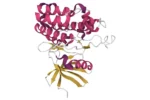AOD9604 peptide is a synthetic version of growth hormone (HGH), a revised version of peptide fragment 176-191 with a disulfide bridge. Despite the peptide’s primary potential being hypothesized in relation to fat reduction (lipolysis), scientific data suggests that it may exert action in the context of heart disease, hypercholesterolemia (the metabolic syndrome), osteoarthritis, and cartilage restoration.
While inhibiting lipogenesis, AOD9604 may potentially stimulate and improve lipolysis (fat disintegration or breakdown). The peptide does not appear to affect IGF-1 or insulin levels and may not have any association in diabetes or glucose intolerance.[1] Researchers comment that “chronic [exposure to] AOD9604 showed no adverse effect on insulin sensitivity of the animals, as [seen] with euglycemic clamp techniques.” There is also no data to suggest that the peptide leads to the formation of antibodies. [2]
AOD9604 and General Research
The peptide appears to stimulate the pituitary gland by acting directly on it. This appears to be the same mechanism of action as GH, as it mimics the actions of the natural growth hormone on body fat metabolism. AOD9604 has been suggested by researchers to accelerate fat-burning processes and restore anabolism by acting on the pituitary gland. The compound has not been implicated in appetite alteration or blood sugar levels.
AOD9604 research in mice suggested that the peptide may impact more than the beta-3-adrenergic receptors on white fat.[4] The scientists suggested that “both hGH and AOD9604 are capable of increasing the repressed levels of beta(3)-AR RNA in obese mice to levels comparable with those in lean mice.” Initially, it was assumed that AOD9604 may increase the metabolic rate in fat cells by binding to these receptors and switching them from storage to user mode. However, even mice lacking these receptors appeared to have reduced fat cell accumulation after being exposed to AOD9604.
Because the beta-3-adrenergic receptor appears to influence fat loss through AOD9604, another mechanism may potentially be at work. The compound may indirectly stimulate apoptosis in white fat cells, according to this theory.
Finally, and tangentially, the peptide appears to have a potential impact in models of osteoarthritis due to alterations observed in the gross clinical exam and microscopic structure of cartilage in an arthritic joint model.
Disclaimer: The products mentioned are not intended for human or animal consumption. Research chemicals are intended solely for laboratory experimentation and/or in-vitro testing. Bodily introduction of any sort is strictly prohibited by law. All purchases are limited to licensed researchers and/or qualified professionals. All information shared in this article is for educational purposes only.
References
- Ng FM, Sun J, Sharma L, Libinaka R, Jiang WJ, Gianello R. Metabolic studies of a synthetic lipolytic domain (AOD9604) of human growth hormone. Horm Res. 2000;53(6):274-8. doi: 10.1159/000053183. PMID: 11146367.
- Stier, Heike, Evert Vos, and David Kenley. “Safety and tolerability of the hexadecapeptide AOD9604 in humans.” Journal of Endocrinology and Metabolism 3.1-2 (2013): 7-15.
- Zieba R. Otyłość: przeglad aktualnie stosowanych leków i nowych zwiazków poddawanych ocenie klinicznej [Obesity: a review of currently used antiobesity drugs and new compounds in clinical development]. Postepy Hig Med Dosw (Online). 2007 Oct 19;61:612-26. Polish. PMID: 17971763.
- Heffernan M, Summers RJ, Thorburn A, Ogru E, Gianello R, Jiang WJ, Ng FM. The effects of human GH and its lipolytic fragment (AOD9604) on lipid metabolism following chronic treatment in obese mice and beta(3)-AR knock-out mice. Endocrinology. 2001 Dec;142(12):5182-9. doi: 10.1210/endo.142.12.8522. PMID: 11713213.
- Jensen MD. Potential role of new therapies in modifying cardiovascular risk in overweight patients with metabolic risk factors. Obesity (Silver Spring). 2006 Jun;14 Suppl 3:143S-149S. doi: 10.1038/oby.2006.294. PMID: 16931496.
- Kwon DR, Park GY. Effect of Intra-articular Injection of AOD9604 with or without Hyaluronic Acid in Rabbit Osteoarthritis Model. Ann Clin Lab Sci. 2015 Summer;45(4):426-32. PMID: 26275694.






